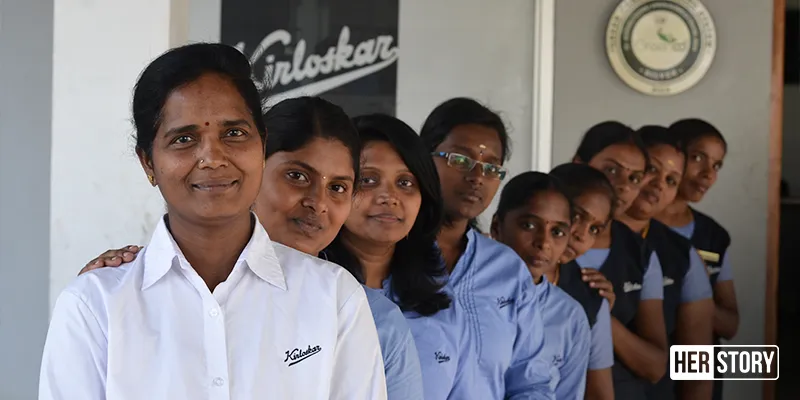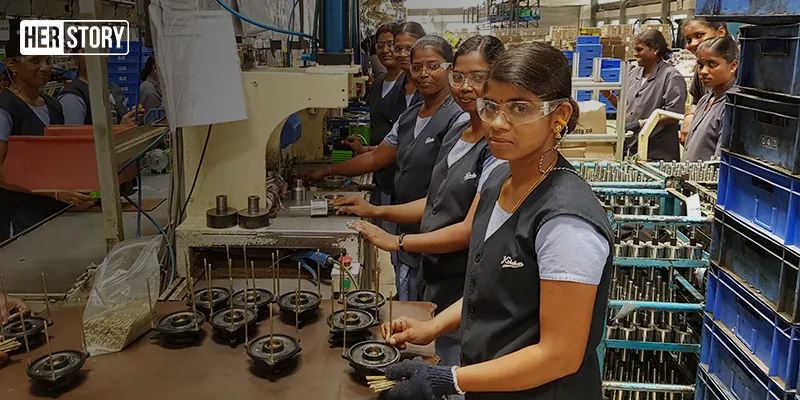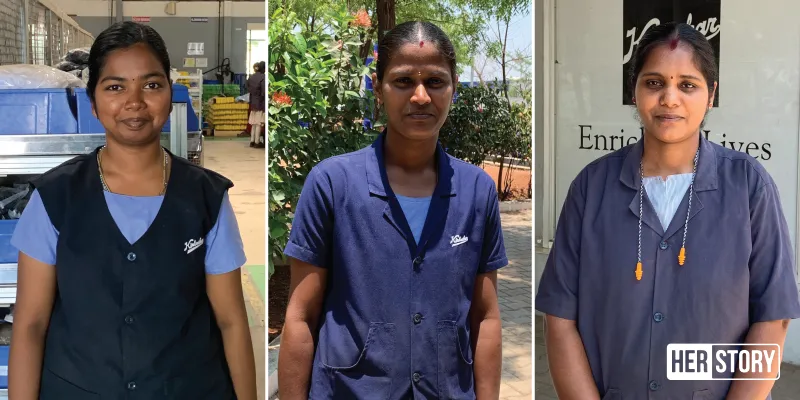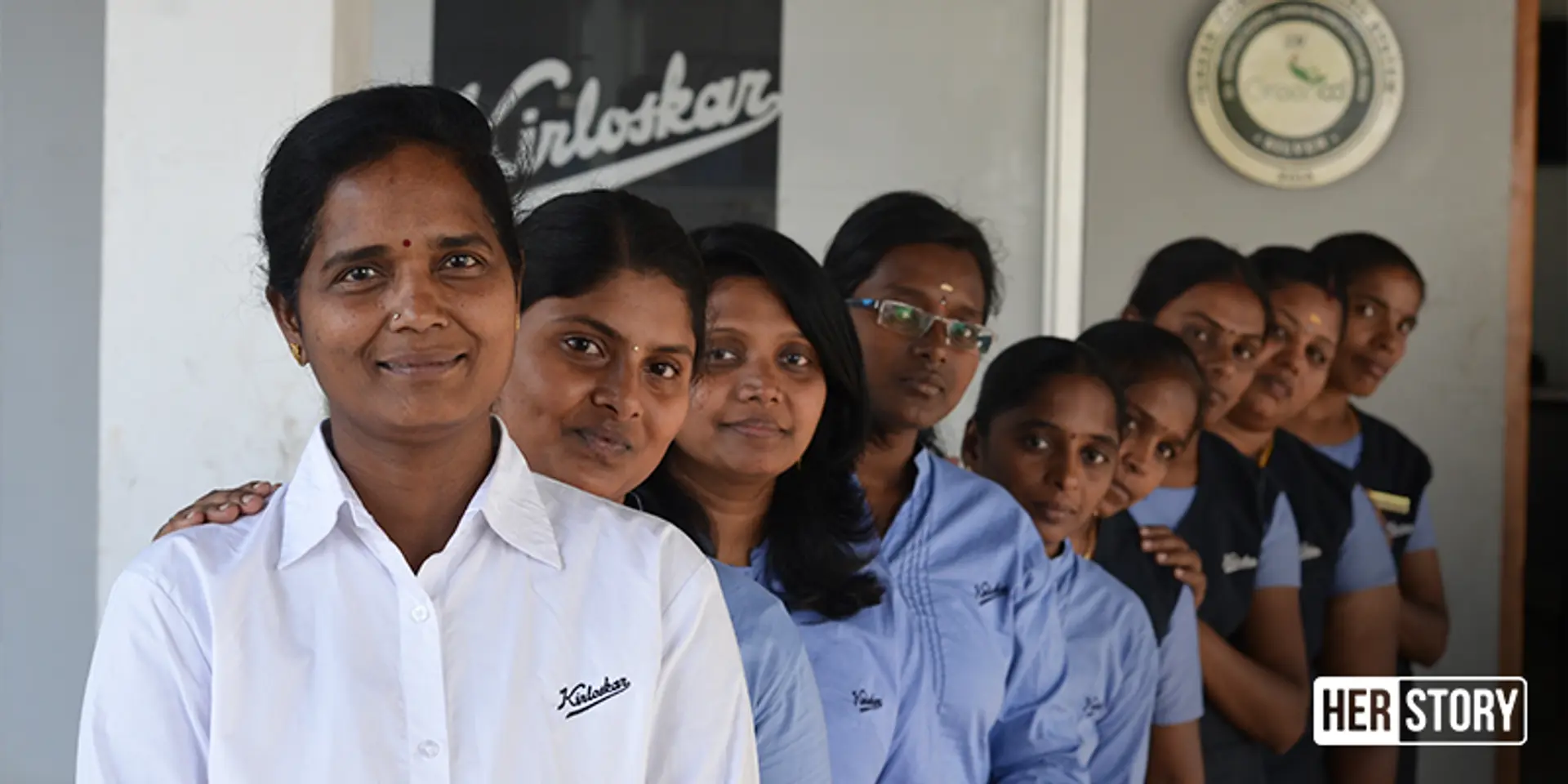How this all-women Kirloskar factory is transforming lives and bringing more women into the workforce
An all-women factory that started as an experiment has turned into a model that other companies should emulate. The pump-manufacturing facility is giving women financial stability and bringing in more women into the workforce across the board for the Kirloskars.
Off the beaten track, in the quaint village of Kaniyur, near Coimbatore in Tamil Nadu, I saw women rewriting their future at the Kirloskar Brothers Ltd (KBL) small pump manufacturing factory. The factory was set up in 2010 under the company’s Mahila Mission 20 project. The idea was simple: since women were the end consumers of small pumps in most households, was it possible to get them to make these pumps and see if they could infuse better efficiencies into the end product?
Not only did this all 200-odd women’s only factory reduce the assembly time for pumps to around 17 seconds (setting a record that got them a mention in the Limca Book of Records), the success of the factory also helped drive policy level change internally. Because of the success of this experiment, KBL has increased hiring of women overheads across the board.

The Plant Head, Lakshmi U and her team
All women’s army
Spread across 4.14 acres, this all-women factory employs about 200 women, of which 84 are skilled and trained on critical operations of the factory. About 105 women are semi-skilled (the workers), while 12 are in support services and unskilled. Together, they form a formidable team.
Walking around exchanging smiles and catching the eye of some of the women at work, I realise the key to their output is their focus. They aren’t easily distracted by visitors. No wonder that a factory that started with one shift has moved on to two shifts. They did lose six-seven women in the process, but most women and their families have been fine with the second shift and the output has grown.
Typically the women produce 14 to 17 variants of small pumps for domestic distribution across India, contributing to over 132 crore - around six percent of the company’s overall output. With the two shifts, the women roll out around eight to nine lakh pumps per year. This amounts to about 70,000-80,000 pumps in a month.
While internally for KBL this helps drive other workers across the country and the world, it has also benefited the women, and in turn their family and community who have first hand seen the transformation these women working at the factory have undergone.
Most women who work in the factory are in the average age bracket of 25-30 years. There are some operators who are older. These women are mostly locals from economically challenged families; school dropouts with no skill sets or training.
Shanthi, who hails from Coimbatore, joined the factory nine years ago when she was 21 years old. She started, like many others, on contract, and over the years with training and experience became a part of the permanent workforce. She started with line production, doing what she was told, but is happy to take on other challenges today. “We were motivated by seniors to not waste the opportunities coming our way because we are women, and never to think that as women we can’t do something,” she says. Shanti, who has a daughter, wants to use her economic independence to fulfill her daughter’s ambitions.
Financial stability and personal development
Most of these women live within a 10 km radius of the factory, 10 percent in the 20-km radius, and a few travel back and forth from Kerala. Around 13 or so women spend four hours in travel from Kerala in vans that pick them up every morning and drop them back.

Assembly line
Raji, who had quit the factory due to family problems, returned because her husband didn’t want her to work anywhere else. She is happy to commute for four hours because she feels the job satisfaction she gets makes it worth her while.
“I have learned life skills that I have taught my husband. There is no risk to health involved by at the factory and the pay is much better than other places. I also like that there are no barriers and I can directly communicate with the plant head without any hesitation. I haven’t studied much but with the skills I have, I want to be a good employee. I have the desire to rise,” she says.
Seeing Raji, many women from across Kerala have joined the factory. “When they join and see the changes in their own life, it makes me feel good,” Raji says.
Expanding their horizons
The factory has adopted many women-specific initiatives to keep employees happy. A nutritious lunch and afternoon tea is provided. A small creche allows women to bring their children to work; the children can spend their time reading, playing with other kids, and watching cartoons. There are clean toilets, with the provision of sanitary napkins and incinerators for disposal.
Events like Family Day and Annual Day are organised, and there are committees to tackle things like sexual harassment, sourcing supplies, delivery and quality checks, and security.
The holistic learning that the women receive in the factory has contributed to the success of the team and overall success of the company. Apart from work-related training, workshops and financial independence, the women also receive advice on financial planning, hygiene, family health, mentorship, and the ability to share and express.
General health camps, including those on cancer awareness, are organised. Tie-ups with hospitals and clinics ensure that the factory is ready to provide medical support as and when needed. Over the years, with the facilities and opportunities, the attrition rate has halved - from 21 percent initially to 10 percent now.
Valarmathi, who has been at the factory for five years, believes that as a housewife she would never have been exposed to the opportunities she gets as a working woman.
“I get to meet people, interact with them, learn new things, debate and participate in competitions,” she says.
Her financial independence has allowed her to buy a two-wheeler, and take a loan to invest in a small house. In fact, she even used her savings for her marriage.
The women participate regularly in Quality Circle Forum of India, headquartered in Hyderabad, where they have debates and present their case studies.
“As a women-only team it feels good to work together, and be able to contribute to such a big company. I feel glad that I am contributing to an organisation and adding value,” Valarmathi says.
When other women see her, clad in jeans and T-shirt, travelling to places, and taking part in competitions, it adds to her confidence. These opportunities of empowerment wouldn’t have come her way had it not been for her job.

L-R: Shanthi, Raji and Valarmathi
Woman on a Mission
Leading these 200-odd women from the front is Lakshmi U. A force to reckon with, she took over two years ago. With two decades of work experience, she has single-handedly been leading the factory. She strives for complete transparency within the factory, and encourages women to give their best. Sure that commitment and ownership are crucial for the team to succeed, she believes in leading by example.
Lakshmi’s day starts at 4.30 am with meditation, followed by cooking for her son. A process and plan-driven leader, she has her list of “to-do things” lined up by 8 am; by 9 am, she is in the factory. She meets all function heads every day to take stock everything from power consumption, energy management, procurement, and delivery, review the next three days’ production plan, and check on any incoming deliveries.
“I keep my focus on the work on new products too, speed up material availability, adding value to that, and taking care of anything else that comes up or needs my attention,” she says.
As the plant head of an all-women factory she says women just need a bit of encouragement to boost their confidence. “In the two decades that I have been working I feel things have changed. Women are ready to take up any job if they set their mind to it. It is not about the labour involved,” she says. “Women don’t have to fear and must believe in themselves,” she adds.
Lakshmi knows everything about her team and the factory; nothing misses her attention. One of the posters in her office reads: “Don’t worry about the future. Create it.”
It is exactly what this all-women KBL factory shows. Women with different skills, trained and enabled and empowered, have the ability to change their narrative, and create their own future.
As I leave the plant I can only admire the tenacity of these women, working in the assembly line and the factory, who are happy with the change they see in their life and the financial power they have to provide for their children. They are turning into role models for their neighbours, and their communities.
And as Lakshmi says: ”Together, we can achieve the impossible.”
Also read:
How 130-year-old Kirloskars is staying relevant in the era of the fourth industrial revolution







